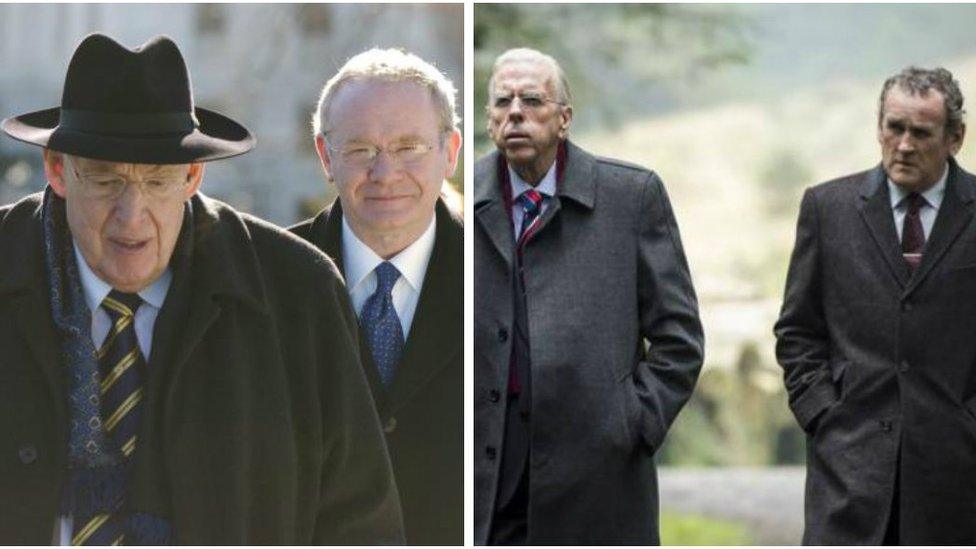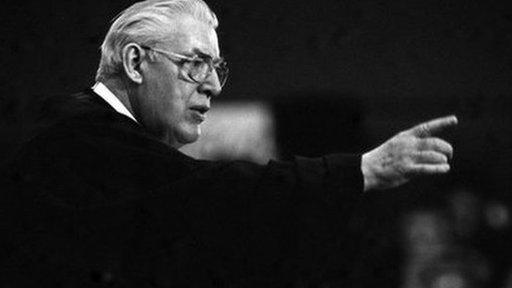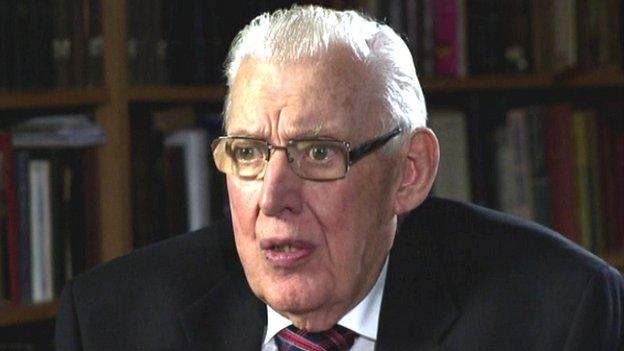The Journey: McGuinness and Paisley film premieres
- Published
A short clip of a new film depicting the unlikely friendship between former enemies
There was a standing ovation in Venice at the world premiere of the new film about Ian Paisley and Martin McGuinness but tougher audiences lie ahead.
Whatever the reaction at the international film festival, people in Northern Ireland will make up their own minds about 'The Journey' and whether Stormont politics can successfully be turned into showbiz.
The truth is that the scriptwriter did not care about the global audience when he put pen to paper.
Colin Bateman from Bangor, County Down, wrote it primarily for a Northern Ireland audience.
Vintage bottle of Buckfast
He says he was only interested in making sure that when he goes to his local cinema he does not have to hide behind the seats afterwards as film-goers try to lynch him for crimes against the movie business.

The film premiered at the 73rd Venice International Film Festival
That is unlikely to happen. The majority of critics in Europe so far have been positive and Bateman says he is ready to celebrate and break open a "vintage bottle of Buckfast".
He may choke on it, however, if he reads the Daily Telegraph review of the film.
'A graceless Wikipedian plod through the Irish peace process" is the headline. Ouch.
As the first journalist from Northern Ireland to see it, I found it uncomfortable viewing at times.
Only good manners stopped me jumping out of my seat in a posh Venice cinema and yelling "That never happened. They've got it wrong. Paisley and McGuinness were never in a car together, never mind a graveyard or a remote forest near Loch Lomond trying to save a dying deer. You're making this up."

'The Journey,' a film about Ian Paisley and Martin McGuinness received a standing ovation at the Venice Film Festival
Silly me. Of course, it was made up.
Political bromance
The film-makers make it clear in the opening sequence that this is a fictional drama.
Yes, Paisley and McGuinness developed a bond in real life, but the movie sets aside the facts and imagines a quicker, action-packed blossoming of the political bromance.
Once you get your head round that, everything is fine. You can resist the urge to scream at the screen... but it takes a while.
There is no doubt the movie will divide opinion at home.
The Belfast-born director Nick Hamm, a Campbell College old boy, calls it a "feel-good film".
Belfast-born director of 'The Journey' talks of 'feel-good' movie about peace
Really?
Ninety percent of the dialogue is about Northern Ireland politics and the 30 years of the Troubles from Bloody Sunday to the hunger strikes to the Poppy Day bombing in Enniskillen.
Indeed at one point Ian Paisley (played brilliantly by Timothy Spall) turns to Martin McGuinness (played equally well by Colm Meaney) and lists one-by-one the names of everyone killed by the IRA bomb at Enniskillen.
Amid the fiction, it is a heavy dose of reality.
Feel-good movie? It did not feel like it then.

Colm Meaney and Timothy Spall play Martin McGuinness and Ian Paisley in the film
Praying together
However, Hamm points to the denouement, the fact that these two old enemies finally realised in later life that there was more that united them than divided them.
They went on to become good friends. They kept in touch after Paisley retired. At one point, they even prayed together.
It is a remarkable story.
At a time when the world seems to be in self-destruct mode, those behind the film believe it is a story a global audience needs to hear.
- Published13 September 2014

- Published13 September 2014

- Published12 September 2014

- Published12 September 2014
